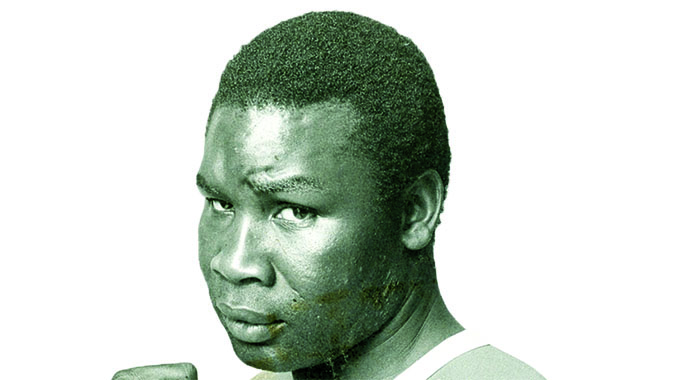‘Kilimanjaro died with heavyweight boxing’
By Langton Nyakwenda
A WORN out boxing poster, which was once white but is turning into brown due to the passage of time, still hangs loosely on the walls of Arigoma Chiponda’s St Mary’s gym in Chitungwiza.

The poster was done in 1998 to market the “much awaited” Xmas Eve heavyweight showdown between a then vibrant Chiponda, known by the moniker “Master Blaster”, and John “Bonyongo The Destroyer” Mutema at the Aquatic Complex in this sprawling dormitory town.
The late Simon “Chopper” Chimbetu, who was riding high after the release of his popular album ‘Lullaby’, is also on the poster as the main musical act for that boxing night.
“I have kept this poster all these years because it reminds me of a time when heavyweight boxing was still the main thing.
“The days when heavyweight bouts would attract sell-out crowds at venues like Rufaro, Ascot in Gweru or even Colliery Stadium in Hwange,” a nostalgic Chiponda told The Sunday Mail Sport.
There was a time, especially during the 1980s and 1990s, when local boxing paraded a cast of heavyweight actors, headlined by the late former African champion Proud “Kilimanjaro” Chinembiri who boxed his way out of Mbare’s slums to the top echelons of international boxing.
This was the era when the likes of Juke Box Timebomb, Black Tiger, Anderson Saizi, Kid Power, Hisman “Flash” Chisango, Walter “Ringo” Star, Chiponda and “Bonyongo The Destroyer” used to dominate sports news headlines.
Those days, the now popular football commentator Charles Mabika was still a renowned ring announcer.
Harare property tycoon Philip “Captain Fiasco” Chiyangwa was one of the boxing promoters of repute and was managing Kilimanjaro.
Chiyangwa left an indelible mark as a boxing and wrestling promoter.
He managed successful pugilists such as Ambrose Mlilo, Gilbert “Giro’’ Josamu and Langton Schoolboy Tinago while he also brought in the famed professional wrestling tag team, the Bushwackers.
It was during that era that Kilimanjaro reached 9th on the WBC rankings, a feat yet to be emulated in Zimbabwe.
Kilimanjaro’s capture of the African Boxing Union, when he knocked out Adama Mensah of Ghana in front of 30 000 fans at Rufaro on September 4, 1981, also remains one of the pinnacles of Zimbabwean boxing.
Kilimanjaro died on February 15, 1994 at the age of 36 with a proud record of 32-6-0. Twenty-eight of those wins came through knock-outs.
Since his death, Zimbabwe has never had an international heavyweight champion.
Now, Zimbabwe only has three active local heavyweight boxers — champion Vincent Muziri, the number one contender Collin Nyamambishi and Simon Madanhire.
“Yes, we have a challenge in that area. We only have three registered active heavyweight boxers,” revealed Thomas Kambuyi, Zimbabwe National Boxing Control Board secretary.
Veteran boxing administrator and former trainer Ed Hammond blames this demise on the lack of a vibrant amateur set-up.
“Amateur boxing is virtually non-existent and yet this should be the conveyor belt for these kind of boxers.
“When you have a vibrant amateur boxing set-up, you have a chance to identify potential heavyweight boxers when they are still young, train them and develop them.
“Back then, we had a whole lot of good amateur boxers. I was a trainer for about 10 years and we had a good number of boxers fighting at the Olympics in the early 1990s.
“We (Zimbabwe) are sitting on a boxing gold mine, yet we are not utilising this opportunity. I believe that because boxing is inherent, if we had great heavyweight boxers in the past, we can still produce more.
“Government should also invest in this sport. I tell you, if we identify one good heavyweight boxer today and get him to America for four years, I am sure we could have a world champion in future,” said Hammond.
Zimbabwe National Boxing Control Board chairman Richard Hondo also added his voice.
“Generally, the heavyweight division is extremely difficult to fill. lt is difficult to find someone who can dominate for a long time, especially when your amateur ranks are not as thriving as they used to.
“When Muhammad Ali left the scene, it took America a long time to produce Mike Tyson. Between Ali and Tyson, there is a gap of about 10 years or so.
“Back home, if you go back to 1956 when boxing started growing in the country, there was Sir Roy Welensky, before Jack Thuli came onto the scene, although Thuli was a South African who fought here in Zimbabwe.
“Tar Baby (Mohamed Alfonso) then came to the fore in the 1970s, and then Kilimanjaro. So you can see that in over 60 years, we have had only four outstanding heavyweight boxers in the country.
“However, we should be smiling again soon because we are on the verge of unearthing a potential heavyweight boxing gem.
“Boxing has been improving during the past two years and that has helped grow interest amongst the youngsters, so around this time next year, we should be talking about a new heavyweight boxer,” said Hondo.
However, Zimbabwe Boxing Federation national coach, Alexander Kwangwari, thinks amateur boxing is not to blame after all.
“It appears as if we are not producing boxers or we are doing nothing but we have our own solid plan.
“We have the National Youth Games in Gweru in August, we are also focusing on the African Games set for Morocco. A lot is happening in the amateur ranks.
“In fact, we have a challenge with some promoters who take immature boxers from the amateur ranks and then turn them professional since they want to make quick money. Boxers need more games as amateurs so that when they turn pro they will have been adequately baked.
“What we recommend is that an open class boxer should have over 30 fights before turning professional. Or one should first fight at international games like the Zonal Games, African Games or Olympics before they turn pro,” said Kwangwari. The Sunday Mail






